Racist Judge Inadvertently Makes the Case for Gay Marriage
The marriage equality movement has been severely damaged by the argument that those opposed to same-sex marriage would be forced to perform weddings against their will.No one has to perform a wedding -- same-sex, interracial or otherwise -- against their will.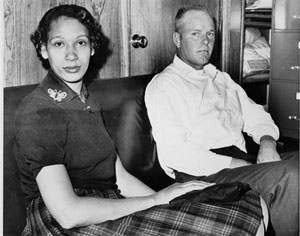
Earlier this month it was reported that a justice of the peace in Louisiana refused to perform the wedding of an interracial couple. Justice Keith Bardwell claimed he was not a racist, having married black couples in his own home, but explained that he declined all interracial marriages out of concern for the children of such unions. He voiced the belief that the children of interracial couples have a difficult time in life. I guess he missed the last election, when an Ivy League-educated lawyer and senator was elected president of the United States. You don’t have to be perceptive to be a racist, just fundamentally irrational.
Bardwell’s ignorance and racism notwithstanding, there is a principle at work with this bigoted Louisiana judge that proves essential to the marriage equality movement. He claimed that he should not have to preside over a marriage that he found morally objectionable. With this I completely agree. All during the Proposition 8 campaign, which resulted in a constitutional ban on same-sex marriage in California, those opposed to marriage equality raised the straw-man that if same-sex marriage were allowed, clergy and others whose faith objected to such a practice would be forced to perform same-gender loving weddings. We who opposed Prop. 8 repeatedly made the case that no one would ever be forced to perform a wedding that was against their religious beliefs. We were only asking for the right to marry for same-gender loving couples. Clergy and persons who in good conscience could perform the weddings would be the only ones to perform same-sex ceremonies.
News reports about the Louisiana case consistently misreported that Bardwell refused to issue a marriage license. That was not accurate. The couple already had a marriage license in hand and went to Bardwell to have their ceremony. He refused and referred them to another justice of the peace nearby and the couple were married later that week.
In Louisiana, and most states in the union, a variety of individuals are or can be authorized by the state to perform a wedding. Judges, clergy and many elected officials are by statute generally able to perform weddings. However, temporary authorization is available in most jurisdictions. Here in San Diego, one can become a deputy marriage commissioner for a day by filing a form and paying a fee.
Being authorized to perform a wedding does not carry the burden of being required to marry any and every person who asks for a ceremony. There are practical reasons for that. Imagine that you became a deputy marriage commissioner for a day in order to perform your best friend’s wedding ceremony down at the beach. After the wedding, a couple from a hundred yards away comes up to you because the person scheduled to perform their wedding didn’t show up. You are on your way to the reception where you have emcee duties for the evening. Would you be legally bound to stay and perform the second couple’s wedding simply because on that day you held authorization to perform weddings? No, you would be free to decline them simply because you were busy or you just didn’t want to do it.
Personally, I refuse to marry any couple in which one person is under 25. I think it’s simply too young. Could I be sued if I refused to perform a wedding for a couple that had come to me for a ceremony? No. I had not denied them the right to get married. I simply declined to participate in that wedding. They are free to get married by someone else.
Clearly, there is a difference between a clergy of a church and a justice of the peace for a county. One is authorized by a private entity (the religious denomination) and the other by a public agency. However stupid and insensitive, Judge Bardwell’s denial did not take away any right of the couple. It was an inconvenience.
The marriage equality movement is all about the right to marry. As stated in Loving v. Virgina, “Under our Constitution, the freedom to marry, or not marry, a person of another race resides with the individual and cannot be infringed by the State.”
Similarly, one has a right to a speedy trial. That right is guaranteed by the state, not by any particular judge. If one judge recuses or is unavailable, your right is guaranteed by the state, which will provide another judge within the legally required time frame. The couple in Louisiana would have a case against the parish (that’s Louisiana for “county”) if they could not find anyone else authorized and willing to perform their wedding. But their case should not be against a particular justice.
The marriage equality movement has been severely damaged by the argument that those opposed to same-sex marriage would be forced to perform weddings by the demand of couples who (for no reason I can imagine) would ask someone absolutely opposed to same-sex marriage to perform their ceremony. As much as we have repeated our denial of such coercion in the past, a bigoted, racist justice of the peace in the backwoods of Louisiana may finally make the case for marriage equality most effectively.
Madison Shockley is minister of the Pilgrim United Church of Christ in Carlsbad, Calif., and a regular commentator on religion, race, politics and popular culture.
Your support matters…Independent journalism is under threat and overshadowed by heavily funded mainstream media.
You can help level the playing field. Become a member.
Your tax-deductible contribution keeps us digging beneath the headlines to give you thought-provoking, investigative reporting and analysis that unearths what's really happening- without compromise.
Give today to support our courageous, independent journalists.
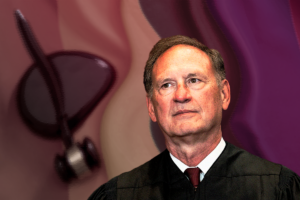
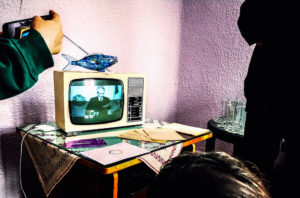

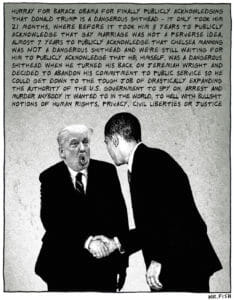
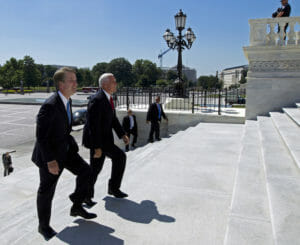
You need to be a supporter to comment.
There are currently no responses to this article.
Be the first to respond.